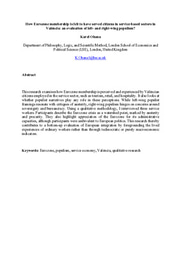Research Project Outline: English Education in Mainland China: A Form of Neocolonialism?
Abstract:
This research explores to what extent and how English education in mainland China is a form of neocolonialism. Neocolonialism refers to when developed countries use economical, political, cultural, or other pressures to indirectly control developing countries. English education can be seen as a means of neocolonialism if it links English proficiency with individual and/or national economic success and glorifies English as the superior language and English speakers as superior to non-speakers.
This research is a case study on mainland China. Previous literature that discusses the relationship between English education and neocolonialism focuses on former colonies and developing countries. China, although never fully colonized by western powers, was significantly controlled and influenced by multiple powers throughout the 20th century. Additionally, this research uses both theoretical and empirical evidence. While previous research discusses neocolonialism theoretically, I plan to cite English textbooks and interviews with English education professionals to back up my argument. The empirical evidence helps us understand neocolonialism more directly in the context of English education. Finally, this research puts English education in an international and political context. I hope to inspire professionals to consider other factors, such as the power differential between languages, when developing English language courses.
Research Objectives & Questions:
Primary objective: examine how English education in mainland China reflects or perpetuates neocolonialism.
Secondary objective: research how English proficiency is perceived as a signal of economic success and/or superiority in mainland China.
Key questions:
- Theoretically, how does English education reflect neocolonialism and is this reflection necessary?
- Empirically, do English textbooks reflect, directly or indirectly, the superiority of the English language and English speakers? How so?
- What motivates people to learn English, and do these motivations reflect the glorification of English?
- How did/will Xi’s policy of rejuvenating traditional Chinese culture influence English education and perception of the English language?
Background: Since the 1980s, China has embraced free market economies and integrated into the globalized economy, called “Reform and Opening,” among Asian countries. Despite the widespread adoption of globalization, it is sometimes seen as detrimental. Suzanne Majhanovich posits that globalization universalizes the interests of economically and politically dominant countries, especially the United States, by imposing their cultural and economic practices globally (Majhanovich 2013).
Given that the United States and the United Kingdom, two former colonial powers, speak English, the language unavoidably embodies and carries their economic and political interests. English language teaching could therefore be seen as the continuation of colonial power dynamics in a postcolonial context. For example, Alastair Pennycook contends that although English as a “universal language” gives non-English speakers access to the world, English education perpetuates global inequalities (Pennycook 2007).
Both Majhanovich and Pennycook cite English education in Asian countries or regions formerly colonized by western powers, such as Cambodia, Malaysia, and Hong Kong. Thus, there is little literature on the same topic but focusing on mainland China.
References:
Majhanovich, Suzanne. English as a Tool of Neo-Colonialism and Globalization in Asian Contexts. Brill.com. Brill, 2013. https://brill.com/display/book/edcoll/9789460919060/BP000019.xml.
Pennycook, Alastair. “ELT and Colonialism.” International Handbook of English Language Teaching, 2007, 13–24. https://doi.org/10.1007/978-0-387-46301-8_2.
Methodology:
Theoretically, I will examine papers that discuss English language education as a form of neocolonialism. Empirically, I will interview about 15 people involved with English education. I will include college students who went through China’s English education process, English teachers, after-school English teachers, and parents. I also aim to examine changes in English textbooks, although it might be difficult to find older textbooks. As of now, I envision a 50/50 division of theoretical and empirical evidence, but the ratio might change once I start collecting empirical data.
Potential Impact:
This research uses mainland China as a case study and includes an empirical approach in addition to previous theoretical literature. Whether the evidence suggests that English education in China reflects neocolonialism or not, this research adds an international and political perspective to the development of English language teaching. Thus, this research potentially influences other scholars and English language educators.
Resources & Support Needed: I would love to learn about neocolonialism systematically. If you have resources that are more theoretical/poli-sci dense, I’m more than happy to read them.
Thank you so much for reading my research project outline, and I would love ANY feedback or questions. Specifically, I’m concerned if my research topic is too general and my research questions are not clear and targeted. If you have ANY feedback on how I can narrow or articulate my research questions better, PLEASE share them with me! Thanks again!




Please sign in
If you are a registered user on Laidlaw Scholars Network, please sign in